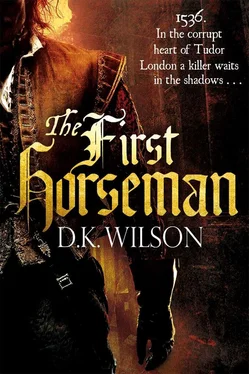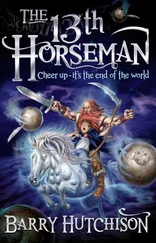D. Wilson - The First Horseman
Здесь есть возможность читать онлайн «D. Wilson - The First Horseman» весь текст электронной книги совершенно бесплатно (целиком полную версию без сокращений). В некоторых случаях можно слушать аудио, скачать через торрент в формате fb2 и присутствует краткое содержание. Год выпуска: 2013, ISBN: 2013, Издательство: Little, Brown Book Group, Жанр: Исторический детектив, на английском языке. Описание произведения, (предисловие) а так же отзывы посетителей доступны на портале библиотеки ЛибКат.
- Название:The First Horseman
- Автор:
- Издательство:Little, Brown Book Group
- Жанр:
- Год:2013
- ISBN:9781405518871
- Рейтинг книги:5 / 5. Голосов: 1
-
Избранное:Добавить в избранное
- Отзывы:
-
Ваша оценка:
- 100
- 1
- 2
- 3
- 4
- 5
The First Horseman: краткое содержание, описание и аннотация
Предлагаем к чтению аннотацию, описание, краткое содержание или предисловие (зависит от того, что написал сам автор книги «The First Horseman»). Если вы не нашли необходимую информацию о книге — напишите в комментариях, мы постараемся отыскать её.
The First Horseman — читать онлайн бесплатно полную книгу (весь текст) целиком
Ниже представлен текст книги, разбитый по страницам. Система сохранения места последней прочитанной страницы, позволяет с удобством читать онлайн бесплатно книгу «The First Horseman», без необходимости каждый раз заново искать на чём Вы остановились. Поставьте закладку, и сможете в любой момент перейти на страницу, на которой закончили чтение.
Интервал:
Закладка:
‘I know exactly what you are all thinking,’ Warden Hayes said. ‘The nineteenth of May is our patronal festival.’
St Dunstan’s Day was, indeed, the most important date in the Company’s calendar. Not only did we celebrate the life of our patron saint at solemn mass, we also went on procession with our banners and a choir, inaugurated our new wardens for the year and changed the date stamp applied to all assayed items of gold and silver. Of course, the celebration ended with another great feast.
I was, perhaps, more irritated than most of my brothers. I was trying hard to take Robert’s advice and re-establish my reputation as a reliable and dutiful member of the Worshipful Company, so it was important for me to be seen as participating faithfully in all our rituals. Having to watch Queen Anne’s execution would be as inconvenient as it would be distasteful. If only I could have known just how drastically the events of St Dunstan’s Day, 1536, would change my life.
‘How are we expected to be in two places at once?’ someone protested.
Hayes nodded. ‘It is, indeed, very unfortunate, but His Majesty has decreed it and we have no choice in the matter. You will have to miss the mass and join the rest of your brothers as soon as you can.’
Later that same day, as I sat at my desk in the workshop, another message was handed to me by one of my men. ‘Brought to the front, sir, by an uncouth fellow none of us recognised,’ he explained. ‘He’s waiting for a reply.’
The letter was in a neat hand and, shutting out the din from the workbenches, I read its few lines.
To Master Thomas Treviot. I commend me to your remembrance, good sir, and am in hope that you are in no worse case than at our last meeting. You spoke then of a daemon that troubled you and I was so bold as to recommend you to seek the ministrations of a reliable physician. I have thought much on what you said then and you will, I hope, forgive me if I venture some further observations. There are several ways to regain a balance of the humours. I have sometimes found borage and black hellebore efficacious in cases of melancholia, and hot, moist food expels dryness from the spleen vapours. Yet, I must not make great pretence to the physician’s art lest you think me as big a quack as that dissembling cozener, Stephanus. However, there is a balm that, in my experience, soothes the melancholic spirit. I refer to company. Time spent with agreeable companions is better than overmuch solitariness. To that end my friends and I are in hopes that it might please you to come to us for supper at the Sign of St Swithun at five in the afternoon of the eighteenth day of May. The bearer will bring your reply.
Your assured friend,
Edward Longbourne
I reached for my quill and inkpot to write a reply offering regrets and explaining that I could not accept an invitation to a party on the eve of St Dunstan’s Day, when I would be extremely busy and would certainly need to have a clear head. Even now, I know not what changed my mind at the last moment. Perhaps it suddenly seemed churlish to turn my back on people who had shown me kindness. Lizzie’s taunts had certainly stung me and it may be that I hoped to convince her that I was not the haughty, judgemental swellhead she took me for. Whatever my reason I accepted the invitation, promising myself that I would not stay long at the party and that I would be safely back in my own bed by nightfall. So, the following Thursday I set off for Southwark, naturally without letting anyone know my destination, for what I imagined would be but a few hours’ diversion.
I heard the party before I saw it. As I entered the courtyard of St Swithun’s House the steady beat of a drum reached me, accompanied by a bagpipe’s wail. These sounds led me to a ground floor room of moderate size already half-filled with revellers. In the centre a circle of men and women were caught up in a lively dance while the spectators encouraged them by clapping the rhythm. It was noisy and very hot. The air was filled with the mingled smell of sweating bodies and cooking meat. I made my way along to the far end where trenchers of food and jugs of ale were laid out on a long table. An older woman with a heavily painted face pressed a flagon into my hand and I had just taken a sip when Ned Longbourne clapped a hand on my shoulder.
‘Welcome to our humble feast, Master Treviot. How like you Wily Winchester’s ale?’
‘Gardiner has provided this?’ I asked in some surprise.
A wispy-bearded little man standing next to Ned laughed through blackened teeth, half-choking on his drink. ‘Oh, aye,’ he spluttered, ‘only he don’t know it. Ain’t that so, doctor?’
‘What Long Ben here means,’ Ned explained, ‘is that a wagon of barley on its way to the good bishop’s brew house from one of his manors met with the same fate as the man who travelled from Jerusalem to Jericho — it fell among thieves. Somehow it ended up here.’
That sent Long Ben into a paroxysm of laughter. Ned steered me away. ‘Come and meet some of your fellow guests.’
The company was more diverse than would have been found in any other gathering within the capital and its sprawling settlements. There were men wearing the aprons or breeches that indicated their trades, young students from the Inns of Court in their gowns and others whose stylish clothes suggested a possible connection with the royal court. The favours of the St Swithun’s ladies, it seemed, were a cloak spread over the whole of society — or, at least, those members of society who cared little for their reputations. In an adjoining room there were tables for cards and dicing. I moved among the crowd, hoping for a glimpse of Lizzie but it was some time before I saw her enter the room with a customer in an unfastened doublet, who had an arm round her waist and was slobbering over her neck. It was no very great surprise that this ‘supper’ was also a way of increasing the bawdy house’s clientele or that Lizzie would be simply doing her job but, somehow, I found the sight distasteful. Coming here, I realised, had been a mistake. Robert was right. It was foolish of me to put my reputation at risk for such people. I decided that I would drink my fill and then leave. I found a corner near the table to lean against and from this vantage point watched the dancers who, as the evening wore on, became increasingly leaden-footed in their capers. From time to time one or other of the women volunteered to convey me to another room for ‘extra entertainment’ but I curtly waved them away.
When candles were lit in the sconces I judged the time was right to leave. The drink, the din, the heat and the smell had begun to cloud my head. I needed fresh air and my own bed. I made an uneven progress towards the door.
‘Not enjoying yourself, Master Treviot?’ Lizzie appeared at my side and linked her arm through mine.
‘It has been very pleasant but I must away home.’
She pouted. ‘Before your wife starts asking awkward questions?’
I turned to face her. ‘I have no wife — and if I had I certainly would not be spending my evenings here.’ The words came out more angrily than I had intended and brought back Lizzie’s familiar scowl.
‘Till you tired of her charms. Then you would be back here soon enough.’
‘Not so!’ I protested and felt my cheeks burning with indignation.
‘Oh, yes so!’ Lizzie stood, shouting. ‘God’s blood, master self-conceited merchant, do you suppose we don’t know all about husbands here? You want your wives to be as chaste as the Blessed Virgin, while you take your pleasure where you will.’ Her sneer was ugly. ‘You’re all from the same mould as Lecher Harry. He grows tired of his wife, goes panting after little Mistress Seymour and when the queen protests it is she who must be charged with adultery.’
Читать дальшеИнтервал:
Закладка:
Похожие книги на «The First Horseman»
Представляем Вашему вниманию похожие книги на «The First Horseman» списком для выбора. Мы отобрали схожую по названию и смыслу литературу в надежде предоставить читателям больше вариантов отыскать новые, интересные, ещё непрочитанные произведения.
Обсуждение, отзывы о книге «The First Horseman» и просто собственные мнения читателей. Оставьте ваши комментарии, напишите, что Вы думаете о произведении, его смысле или главных героях. Укажите что конкретно понравилось, а что нет, и почему Вы так считаете.












